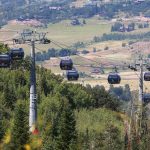Planning Commissioner David Box enters race for City Council District 3

Courtesy of David Box
David Box has entered the race for the District 3 seat on the Steamboat Springs City Council, running on a platform of “common sense leadership” rooted in professional expertise, civic involvement and a commitment to addressing the city’s most pressing challenges.
Box, a member of the city’s Planning Commission, is campaigning for the seat that will be left open by Councilor Dakotah McGinlay, who announced in June that she will not seek re-election after serving on council since 2021.
Box and his wife Diana moved to Steamboat around three years ago. Though relatively new to the community compared to some council candidates, he emphasized that Steamboat is now home.
“We love the valley, we love our city,” said Box, who in May opened a homeowners association management company, Rabbit Ears Management. “We’re really taking our time to keep getting involved and learning about the city, which really drove into a huge belief in service.”
“People say, ‘You live in a resort town,'” he added. “No, we don’t. We live in an awesome community that just happens to have a ski mountain.”
Box, who has over 30 years of experience in financial services, became involved in local government shortly after moving to Steamboat, first by appointment to the city’s Board of Adjustment and then to the Planning Commission.
He also previously served for six years on the Planning and Zoning Commission for the city of Frisco, moving up from commissioner to vice chair and to chairperson by the end of his tenure.
“Planning is so important to what we want to do,” said Box. “We don’t want to become Aspen, but we’re going to grow. So how do you manage that growth? You do that in a way that it meets the needs of our community and those who live here.”
A volunteer with the Steamboat Rotary Club and his church, Box explained that his decision to run for council was made “gradually” and was influenced by both growing ties within the community and a desire to continue the work of providing representation to District 3.
“Dakotah (McGinlay) opened up the ability for a part of this community that didn’t have a voice,” said Box. “I respect that, I want to continue that, but also utilize my experience to ensure that we operate with a fiscally sound method, but also are tackling the big issues we’re facing.”
Regarding the performance of the current council, Box said he believes they are “very committed to their work,” but sees room for improvement in meeting efficiency and civic engagement.
“I’m a firm believer that all of our elected officials should exhibit a diversity of thought and not have groupthink. I don’t think we have that,” said Box, “but I think we can do it in a more respectful fashion.”
“People don’t want to come to our City Council meetings because they last too long,” he noted. “So how can we reduce the time of our meetings to increase civic involvement and also ensure that voice is heard?”
“One thing I learned early on in civic work is, you don’t always have to speak up,” Box added. “I think there’s an opportunity there.”
He also advocates for reaching out beyond traditional touchpoints, noting that while council members attend the local Farmers Market to engage, “that only meets a certain part of our demographic.”
“Part of our demographic is working on Saturday mornings,” said Box. “So how are we reaching all of our individuals? Are we going into businesses and setting some time and talking with folks, hearing what’s important to them?”
Box said one of the main strengths he would bring to council is the ability to listen deeply without preconceived notions.
“If you think you’re a good listener, you’re not,” he said. “I’ve tried really hard to listen and learn from others.”
He underscored this approach as critical both in business and on the Planning Commission, where decisions consider the long-term impact on the community.
“It’s not thinking about what happens tomorrow,” said Box. “It’s thinking about what the effects are five, 10 years down the road.”
Key challenges: housing, transportation, taxation
Box identified three major intertwined challenges facing Steamboat Springs: housing, transportation and taxation. He described the city as more than a resort town, underscoring the need for homes across the spectrum.
“We don’t have a starter home here. We don’t have the next step here,” he said. “Let’s manage the growth so we retain the city that we want it to be, and also can change it so young people can live here.”
On transportation, Box pointed out the notorious infrastructure issues on U.S. Highway 40 and mentioned the expanded transit opportunities presented by the proposed Yampa Valley Regional Transportation Authority. He said he supports the formation of the RTA, which is likely to go to ballot for six jurisdictions across the valley in November.
“The next step is the hard step,” he said. “Transportation is not a cost-mutual debt. It costs money. So how do we pay for it? How do we provide transportation for this valley?”
Box recommends that the city examine the Eagle Valley RTA and Roaring Fork Transportation Authority to “look at their mistakes, their successes” and “hopefully take the successes out.”
He also raised concerns about taxation and the city budget, which is likely to see service cuts next year due to a projected 2% decline in sales tax growth. Box underscored the need for fiscal responsibility while meeting community needs amid federal and state headwinds that could cut grants and have trickle-down impacts to local municipalities.
“We’re going to have to make some really hard decisions at the city level,” he said. “I’m ready to do that and explain the ‘why.'”
Housing is a top priority for Box, who acknowledged the contentious Brown Ranch development process and voter rejection of prior plans.
“Our voters spoke loud and clear and said, ‘What was presented in the ballot prior was not acceptable,'” said Box, who clarified that he sees Brown Ranch as part of the portfolio, but not the only solution.
He also encourages learning from other communities’ successes, mentioning short-term to long-term rental conversions and supporting inclusionary housing “done the right way,” where affordable and market-rate homes look indistinguishable to promote community integration. He also supports more accessory dwelling units to expand rental options.
Regarding the Yampa Valley Housing Authority, Box pointed to the loss of community trust due to past events and election issues. He emphasized that the housing authority must regain the city’s trust and effectively serve its citizens.
“I want the YVHA board to solve it,” he said. “That’s why they’re there.”
If elected, Box said he would define his success in terms of effective housing, transportation and fiscal policies that preserve the city’s character and serve both its business and nonprofit communities.
“Continuing to build upon all of those, I call that success,” he said.
The race for District 3 will see Box running against fellow Planning Commissioner John Agosta, who unsuccessfully ran for the at-large seat in the 2023 election.
Box encourages residents who may be interested in learning more about his campaign to reach out at David4Steamboat@gmail.com.

Support Local Journalism

Support Local Journalism
Readers around Steamboat and Routt County make the Steamboat Pilot & Today’s work possible. Your financial contribution supports our efforts to deliver quality, locally relevant journalism.
Now more than ever, your support is critical to help us keep our community informed about the evolving coronavirus pandemic and the impact it is having locally. Every contribution, however large or small, will make a difference.
Each donation will be used exclusively for the development and creation of increased news coverage.









